

What is social isolation? Written by: No Isolation Last updated: June 5, 2020 Social isolation is a term often used interchangeably with loneliness, but while the two are closely related, they do not necessarily mean the same thing.
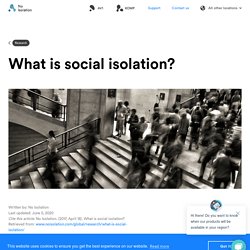
You can be lonely in a crowd, but you will not be socially isolated. Isolation has been defined as an objective state whereby the number of contacts a person has can be counted, whereas loneliness is a subjective experience. While the terms may have slightly different meanings, both can be painful experiences and have a harmful impact on the individual. Social Isolation Among Older Individuals: The Relationship to Mortality and Morbidity - The Second Fifty Years - NCBI Bookshelf. Causes of Social Isolation in Elderly Adults. No one likes to feel lonely or isolated, but for many seniors, it’s a feeling they know all too well.
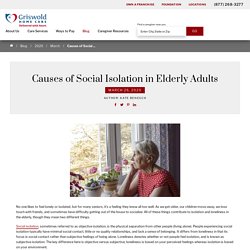
As we get older, our children move away, we lose touch with friends, and sometimes have difficulty getting out of the house to socialize. All of these things contribute to isolation and loneliness in the elderly, though they mean two different things. Social isolation, sometimes referred to as objective isolation, is the physical separation from other people (living alone).
People experiencing social isolation typically have minimal social contact, little or no quality relationships, and lack a sense of belonging. It differs from loneliness in that its focus is social contact rather than subjective feelings of being alone. People are considered to be isolated if they live alone, never go out of the house, have no close relatives, never visit anyone, have no contact with neighbors, have no phone, or are alone for more than 9 hours a day. Download a Free Guide to Home Care Summary. Health Effects of Social Isolation and Loneliness – Aging Life Care Association™ Clifford Singer, MD Adjunct Professor, University of Maine Chief, Geriatric Mental Health and Neuropsychiatry Acadia Hospital and Eastern Maine Medical Center 268 Stillwater Avenue Bangor Maine 04402 207.973.6179 csinger@emhs.org Cliff Singer is a geriatrician and psychiatrist.
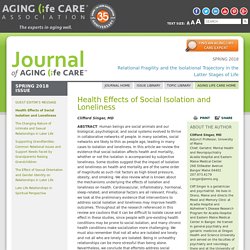
He lives in Orono, Maine and directs the Mood and Memory Clinic at Acadia Hospital and Alzheimer’s Disease Research Program for Acadia Hospital and Eastern Maine Medical Center in Bangor. Why Loneliness Is Hazardous to Your Health. Source: Woman home alone by ezeileagu chibisi chidubem.
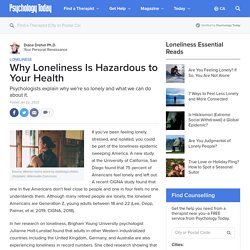
Wikimedia Commons If you’ve been feeling lonely, stressed, and isolated, you could be part of the loneliness epidemic sweeping America. A new study at the University of California, San Diego found that 75 percent of Americans feel lonely and left out. A recent CIGNA study found that one in five Americans don't feel close to people and one in four feels no one understands them. Although many retired people are lonely, the loneliest Americans are Generation Z, young adults between 18 and 22 (Lee, Depp, Palmer, et al, 2019; CIGNA, 2018). article continues after advertisement In her research on loneliness, Brigham Young University psychologist Julianne Holt-Lunstad found that adults in other Western industrialized countries including the United Kingdom, Germany, and Australia are also experiencing loneliness in record numbers.
The negative effects are staggering. Source: Meg Van Deusen, used with permission. Health Effects of Social Isolation and Loneliness – Aging Life Care Association™ #HealthyAtHome - Mental health. As countries introduce measures to restrict movement as part of efforts to reduce the number of people infected with COVID-19, more and more of us are making huge changes to our daily routines.
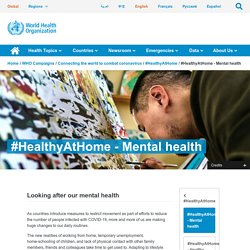
The new realities of working from home, temporary unemployment, home-schooling of children, and lack of physical contact with other family members, friends and colleagues take time to get used to. Adapting to lifestyle changes such as these, and managing the fear of contracting the virus and worry about people close to us who are particularly vulnerable, are challenging for all of us. They can be particularly difficult for people with mental health conditions. Fortunately, there are lots of things that we can do to look after our own mental health and to help others who may need some extra support and care. Here are tips and advice that we hope you will find useful. Don’t discriminate Fear is a normal reaction in situations of uncertainty. Be kind. Suggestions from World Health Organisations. Healing the Epidemic of Isolation for Senior Citizens. How to Avoid Social Isolation During Coronavirus Pandemic. 2.
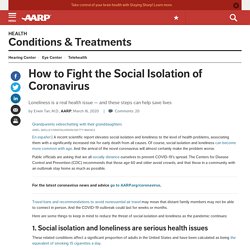
Plan and connect It's important to talk to family and friends to develop a plan to safely stay in regular touch as we socially distance ourselves, or if we are required to self-quarantine for a possible exposure or are in isolation for a COVID-19 infection. This plan should confirm whom you can reach out to if you need help accessing food, medicine and other medical supplies. Addressing Social Isolation Among Seniors. Betty's Case. Treatment.